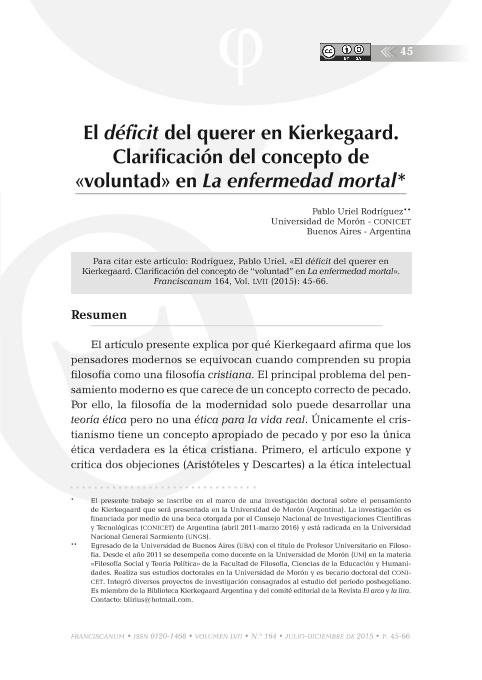Mostrar el registro sencillo del ítem
dc.contributor.author
Rodríguez, Pablo Uriel

dc.date.available
2020-06-29T19:58:32Z
dc.date.issued
2015-12
dc.identifier.citation
Rodríguez, Pablo Uriel; El déficit del querer en Kierkegaard. Clarificación del concepto de voluntad en La enfermedad mortal; Universidad de San Buenaventura; Franciscanum; 57; 164; 12-2015; 45-66
dc.identifier.issn
0120-1468
dc.identifier.uri
http://hdl.handle.net/11336/108435
dc.description.abstract
El artículo presente explica por qué Kierkegaard afirma que los pensadores modernos se equivocan cuando comprenden su propia filosofía como una filosofía cristiana. El principal problema del pensamiento moderno es que carece de un concepto correcto de pecado. Por ello, la filosofía de la Modernidad sólo puede desarrollar una teoría ética pero no una ética para la vida real. Únicamente el cristianismo tiene un concepto apropiado de pecado y por eso la única ética verdadera es la ética cristiana. Primero (1.), el artículo expone y critica dos objeciones (Aristóteles y Descartes) a la ética intelectual desde el punto de vista de Kierkegaard. Segundo (2.), el artículo reconstruye la noción de voluntad humana que es desarrollada en O lo uno o lo otro. Tercero (3.), el artículo analiza el argumento principal de La enfermedad Mortal: sin la idea cristiana de la voluntad, como Kierkegaard la interpreta en La Enfermedad Mortal, la concepción socrática e intelectual del pecado no puede ser superada.
dc.description.abstract
The present paper explains why Kierkegaard affirms that the modern thinkers are wrong when they understand their own philosophy as a christian philosophy. The main problem of modern thought is that it lacks of a correct concept of sin. Because of that, the philosophy of the Modern age can only develop an ethic theory but not an ethic for the actual life. Only Christianity has a proper concept of sin that´s why the only true ethic is the christian one. First, the paper exposes and criticizes two objections (Aristotle and Descartes) against the intellectual ethic from Kierkegaard´s point of view. Second, the paper reconstructs the notion of human will wich is developed in Either Or. Third, the paper analyzes the main argument of Sickness unto Death: without the christian idea of the will, as Kierkegaard interprets it in Sickness unto Death, the socratic and intellectual conception of the sin can not be overcome.
dc.format
application/pdf
dc.language.iso
spa
dc.publisher
Universidad de San Buenaventura
dc.rights
info:eu-repo/semantics/openAccess
dc.rights.uri
https://creativecommons.org/licenses/by-sa/2.5/ar/
dc.subject
Kierkegaard
dc.subject
pecado
dc.subject
voluntad
dc.subject
Modernidad
dc.subject.classification
Ética

dc.subject.classification
Filosofía, Ética y Religión

dc.subject.classification
HUMANIDADES

dc.title
El déficit del querer en Kierkegaard. Clarificación del concepto de voluntad en La enfermedad mortal
dc.title
The deficit of willingness in Kierkegaard. Clarification of the concept of will in Sickness unto Death
dc.type
info:eu-repo/semantics/article
dc.type
info:ar-repo/semantics/artículo
dc.type
info:eu-repo/semantics/publishedVersion
dc.date.updated
2020-06-29T16:34:56Z
dc.journal.volume
57
dc.journal.number
164
dc.journal.pagination
45-66
dc.journal.pais
Colombia

dc.journal.ciudad
Bogotá
dc.description.fil
Fil: Rodríguez, Pablo Uriel. Universidad Nacional de General Sarmiento. Instituto de Ciencias; Argentina. Universidad de Morón; Argentina. Consejo Nacional de Investigaciones Científicas y Técnicas; Argentina
dc.journal.title
Franciscanum
dc.relation.alternativeid
info:eu-repo/semantics/altIdentifier/url/https://dialnet.unirioja.es/servlet/articulo?codigo=5189557
Archivos asociados
